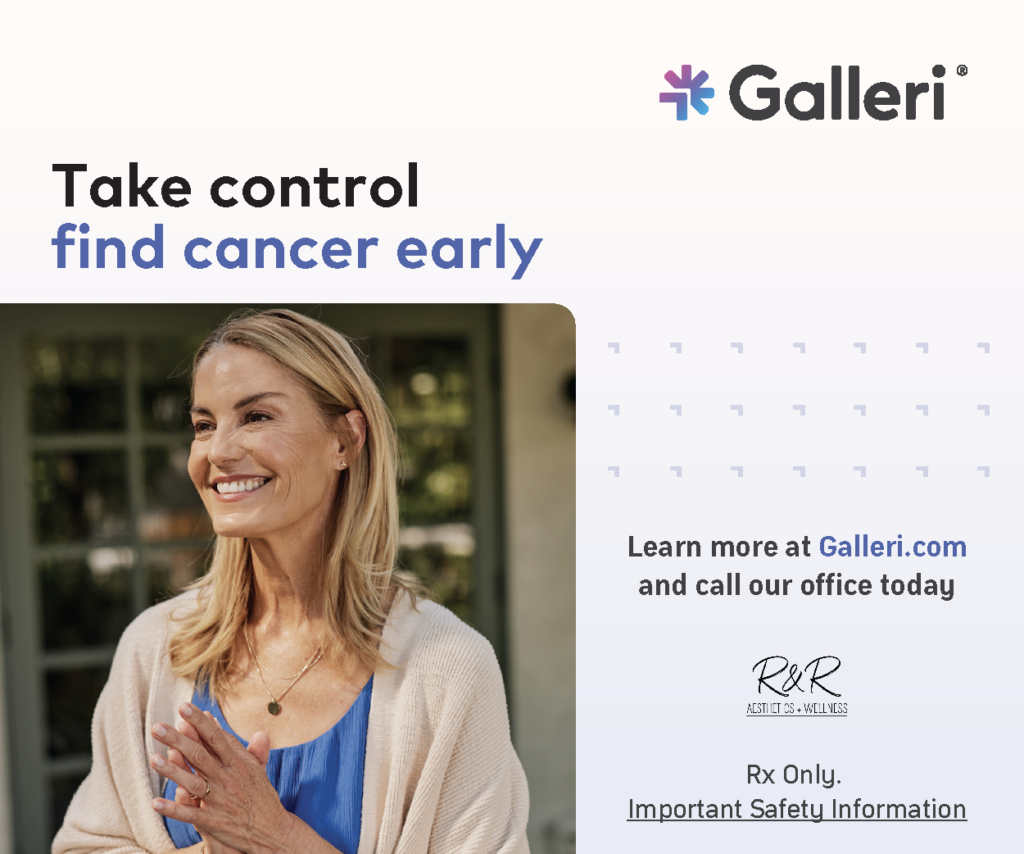
Galleri®
Screening for multiple cancers is now possible with Galleri®
With over 50 types of cancer detected to date through a shared cancer signal, Galleri is redefining early cancer detection.1
The Galleri test does not detect a signal for all cancers and not all cancers can be detected in the blood. False positive and false negative results do occur.
Step 1: Book a virtual consult with your provider.
Step 2: Kit sent directly to your house. Easy set up for lab draw – instructions provided.
Step 3: Results sent directly to you.
How Galleri Works
All cells in your body, including cancer cells, contain DNA. DNA from cancer cells is different from healthy cell DNA. When cells complete their life cycle and die, fragments of their DNA enter the bloodstream.3 These fragments are called cell-free DNA. The Galleri test screens your blood sample for cell-free DNA and identifies whether it comes from healthy or cancer cells.2
DNA from cancer cells has specific methylation patterns that identify it as cancer. Methylation is a natural process that can change the activity of DNA. Methylation patterns also contain information about the tissue type or organ associated with the cancer signal.4
Galleri is a screening test that looks for cancer before symptoms appear, when cancer may be easier to treat. It is important to get cancer screenings even if you feel fine.1
Only Galleri gives you the power to screen early for a signal shared by multiple cancers.2
Laboratory/Test Information
GRAIL’s clinical laboratory is certified under the Clinical Laboratory Improvement Amendments of 1988 (CLIA) and accredited by the College of American Pathologists (CAP). The Galleri test was developed, and its performance characteristics were determined by GRAIL. The Galleri test has not been cleared or approved by the Food and Drug Administration. GRAIL’s clinical laboratory is regulated under CLIA to perform high-complexity testing. The Galleri test is intended for clinical purposes.
Safety Information
The Galleri test is recommended for use in adults with an elevated risk for cancer, such as those aged 50 or older. The Galleri test does not detect all cancers and should be used in addition to routine cancer screening tests recommended by a healthcare provider. Galleri is intended to detect cancer signals and predict where in the body the cancer signal is located. Use of Galleri is not recommended in individuals who are pregnant, 21 years old or younger, or undergoing active cancer treatment.
Results should be interpreted by a healthcare provider in the context of medical history, clinical signs, and symptoms. A test result of “No Cancer Signal Detected” does not rule out cancer. A test result of “Cancer Signal Detected” requires confirmatory diagnostic evaluation by medically established procedures (e.g. imaging) to confirm cancer.
If cancer is not confirmed with further testing, it could mean that cancer is not present or testing was insufficient to detect cancer, including due to the cancer being located in a different part of the body. False-positive (a cancer signal detected when cancer is not present) and false-negative (a cancer signal not detected when cancer is present) test results do occur. Rx only.
References:
- Klein EA, Richards D, Cohn A, et al. Clinical validation of a targeted methylation-based multi-cancer early detection test using an independent validation set. Ann Oncol. 2021;32(9):1167-77. DOI:https://doi.org/10.1016/j.annonc.2021.05.806.
- US Preventive Services Task Force. Recommendations Cancer. Accessed 7Mar2023. https://www.uspreventiveservicestaskforce.org/uspstf/topic_search_results.
- Schrag D, McDonnall CH, Naduld L, et al. PATHFINDER: A Prospective Study of a Multi-Cancer Early Detection Blood Test. Presentation at European Society of Medical Oncology (ESMO) Congress September 9-13, 2022; Paris, France.
- Hubbell E, Venn O, Shanmugam A. Shared Cancer Signal: Evidence from Cross-Training. Presentation at USC Computational Biology Symposium; May 19-21, 2022; Los Angeles, CA.